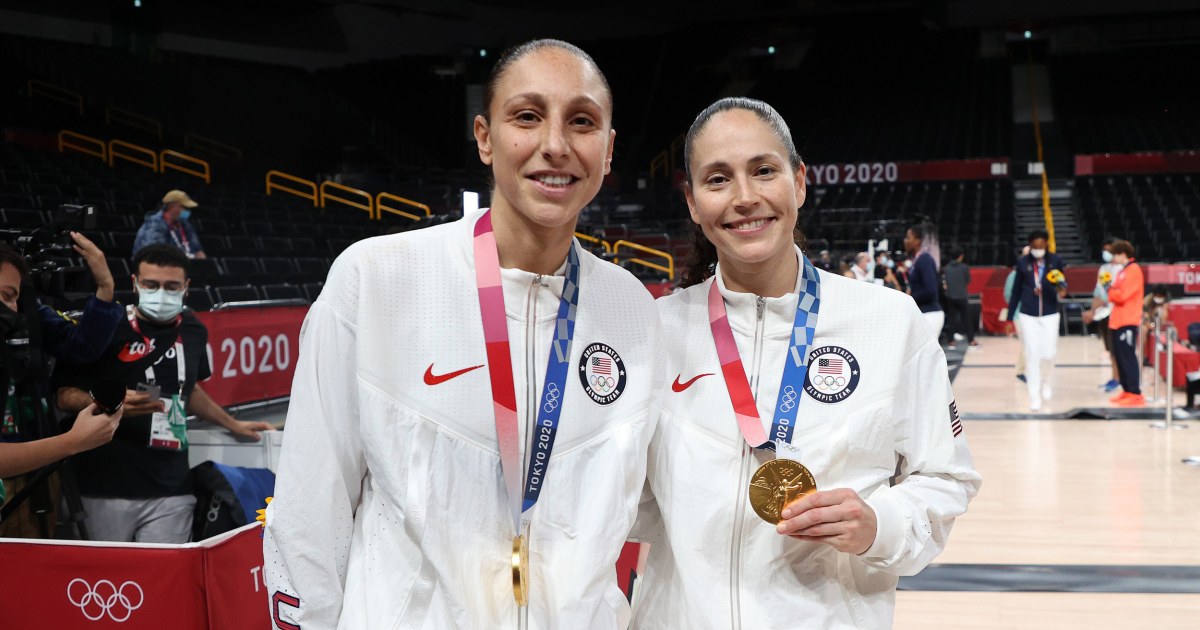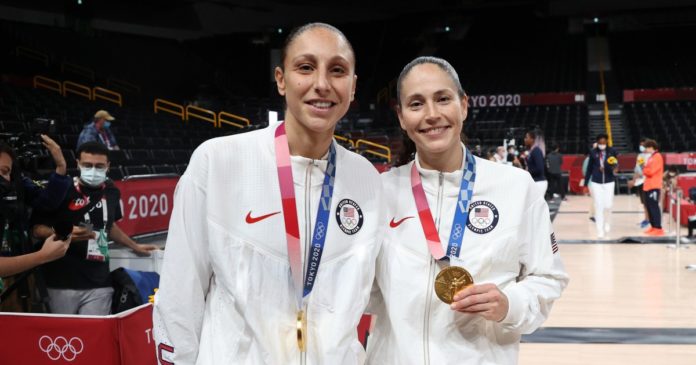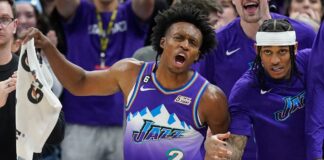
As the torch goes out at Japan National Stadium in Meiji-Jingu Park, the end has arrived for the 2020 Tokyo Summer Games— dubbed “the rainbow Olympics” by some for the record number of LGBTQ competitors.
At least 182 out athletes from approximately 30 nations attended the Tokyo Games, more than three times the number of out athletes who competed in the 2016 Summer Games in Rio, according to LGBTQ sports site Outsports.
Of those athletes, who competed in some 35 different sports, at least 55 medaled — five nabbed gold for Team USA women’s basketball alone. In fact, if the LGBTQ Olympians competed as their own country — affectionately labeled “Team LGBTQ” by Outsports — they would rank 11th in the total medal count (right behind France and before Canada), with 32 team and individual medals: 11 gold, 12 silver and nine bronze.
Gold medalists include Brazilian swimmer Ana Marcela Cunha for the 10km event; French martial artist Amandine Buchard for mixed team judo; Venezuelan track and fielder Yulimar Rojas for the triple jump; Irish boxer Kellie Harrington; New Zealand rower Emma Twigg; United States women’s national basketball team members Sue Bird, Chelsea Gray, Brittney Griner, Breanna Stewart and Dianna Taurasi; American 3×3 basketball player Stefanie Dolson; Canadian women’s soccer team members Quinn, Kadeisha Buchanan, Erin McLeod, Kailen Sheridan and Stephanie Labbe; French handball players Amandine Leynaud and Alexandra Lacrabère; New Zealand rugby players Gayle Broughton, Ruby Tui, Kelly Brazier and Portia Woodman; and, of course, British diver Tom Daley, who finally took home the gold for synchronized diving at his fourth Games.
“I feel incredibly proud to say that I am a gay man and also an Olympic champion,” Daley, 2, told reporters after he and diving partner Matty Lee scored a winning 471.81 on the 10m platform. “When I was younger I didn’t think I’d ever achieve anything because of who I was. To be an Olympic champion now just shows that you can achieve anything.”
But Daley’s victory — complete with images of him knitting a tiny cozy for his medal — was just one of many queer stories to come out of the Games.
After earning silver for the Philippines, featherweight boxer Nesthy Petecio told reporters, “I am proud to be part of the LGBTQ community,” according to the Philippine Daily Inquirer,
“Let’s go, fight!” she added. “This fight is also for the LGBTQ community.”
The 2020 Summer Games also saw the first out transgender Olympians — including Canada’s Quinn, who won a gold medal for their country’s women’s soccer team. Quinn, a midfielder who uses they/them pronouns, helped the squad earn gold after a matchup with Sweden. Before coming out as trans, Quinn won a bronze with Team Canada at the 2016 Summer Games in Rio.
In a July 22 Instagram post Quinn said they felt sad “there were Olympians before me unable to live their truth because of the world.”
Following their championship match, Quinn wrote on Instagram, “Olympic Champions! Did that really just happen?!?”
There were also stories of activism off of the playing field: Team USA shot putter Raven Saunders risked having her silver medal revoked after she raised her hands and crossed them in an “X” gesture while standing on the podium.
Saunders, a lesbian, said the symbol represented “the intersection of where all people who are oppressed meet,” according to The Associated Press. “My message is to keep fighting, keep pushing, keep finding value in yourself, find value in everything you do.”
She has spoken about her struggles with depression and advocates for both racial justice and mental health.
“I’m not just fighting for myself,” Saunders told NBC Olympics reporter Lewis Johnson after the ceremony. “I’m fighting for a lot more people. I want to give a shoutout to all of the LGBTQ community. Everybody that is dealing with mental health issues. Everybody who is Black. I’m giving a shoutout to everybody.”
IOC regulations ban political statements or protests on the podium, but the organization suspended its investigation into Saunders’ actions after she announced her mother, Clarissa Saunders, had died.
There were heartwarming stories, too: After winning a silver medal at the women’s quadruple sculls, Polish rower Katarzyna Zillman publicly thanked her girlfriend.
“I called my girlfriend, Julia Walczak, a Canadian woman,” Zillman told Wirtualna Polska. “I showed her the medal, she confessed to me that for the last two weeks she had been one big bundle of nerves. And today she was relaxed. For me it is also a day of great relief and relaxation, after five years, when every day I thought about the race for the Olympic medal and the moment when we will win it.”
Zillman has spoken to the press about being in a same-sex relationship before, she told Sportowe Fakty, “but for some reason, it wasn’t published.”
Poland has seen a rise in state-sanctioned homophobia in recent years, with dozens of cities passing ordinances declaring themselves “LGBT-free zones.” In 2020, President Andrzej Duda won a second five-year term after calling LGBTQ ideology “more destructive” than communism and signing a “Family Charter” pledge to ban same-sex marriage, gay adoption rights and teaching about LGBTQ issues in schools.
Zillman said she was glad to use the Games as a chance to advocate for the LGBTQ community.
“I know that in this way I will help others,” she told Sportowe Fakty. “It was enough that I showed up in a T-shirt with the words ‘Sport against homophobia’ and I got a few messages from young girls practicing rowing. One of them opened up to me, described her difficult home situation to me, and confessed that I helped her a lot with my attitude. One such message is enough to completely forget about thousands of hate comments and disgusted faces.”
Days after Zillman’s press conference, Italian archer Lucilla Boari also came out after defeating American Mackenzie Brown to win the bronze, the first Italian woman to medal in the sport.
In a livestreamed press conference, Boari received a message of support from Dutch archer Sanne de Laat, who did not attend the Games.
“It’s super, super, super, amazing and I’m super proud of you,” De Laat said, the Advocate reported. “I can’t wait until you’re here so I can give you the biggest hug there is. I love you so much. Great job.”
A tearful Boari told reporters: “That’s Sanne, my girlfriend.”
While Italy does not have the same anti-LGBTQ reputation as Poland, the largely Catholic country is among the more conservative in Western Europe. Same-sex marriage is not recognized, and anti-discrimination laws protecting sexual orientation and gender identity are limited.
Joanna Hoffman, communication director for Athlete Ally, a nonprofit that advocates for inclusion in sports at all levels, said the historic number of out Olympians and Paralympians “speaks to how far we’ve come in terms of inclusivity, visibility and representation.”
“The trailblazing athletes at this year’s Games are groundbreaking not only for their own triumphs, but also for showing the world that LGBTQ+ people belong in every part of life, especially and including sports,” Hoffman told NBC News.
But she underscored that creating an inclusive sports culture required a holistic approach, “and never putting the onus on an LGBTQ+ athlete to come out.”
“Rather, it’s on coaches, leagues and governing bodies to meaningfully create and sustain safe spaces so that athletes feel they can be their authentic selves if and when they do come out.”







